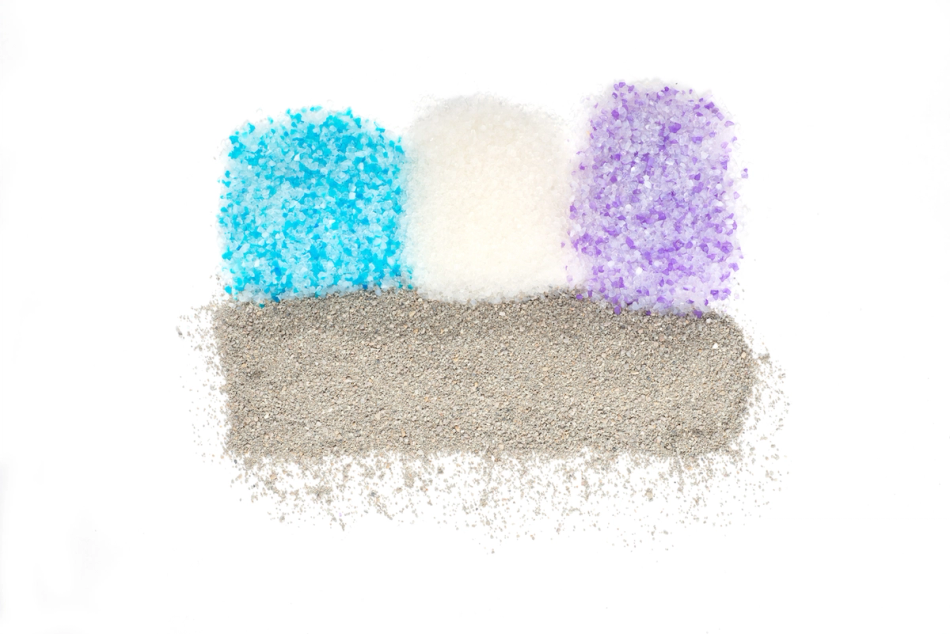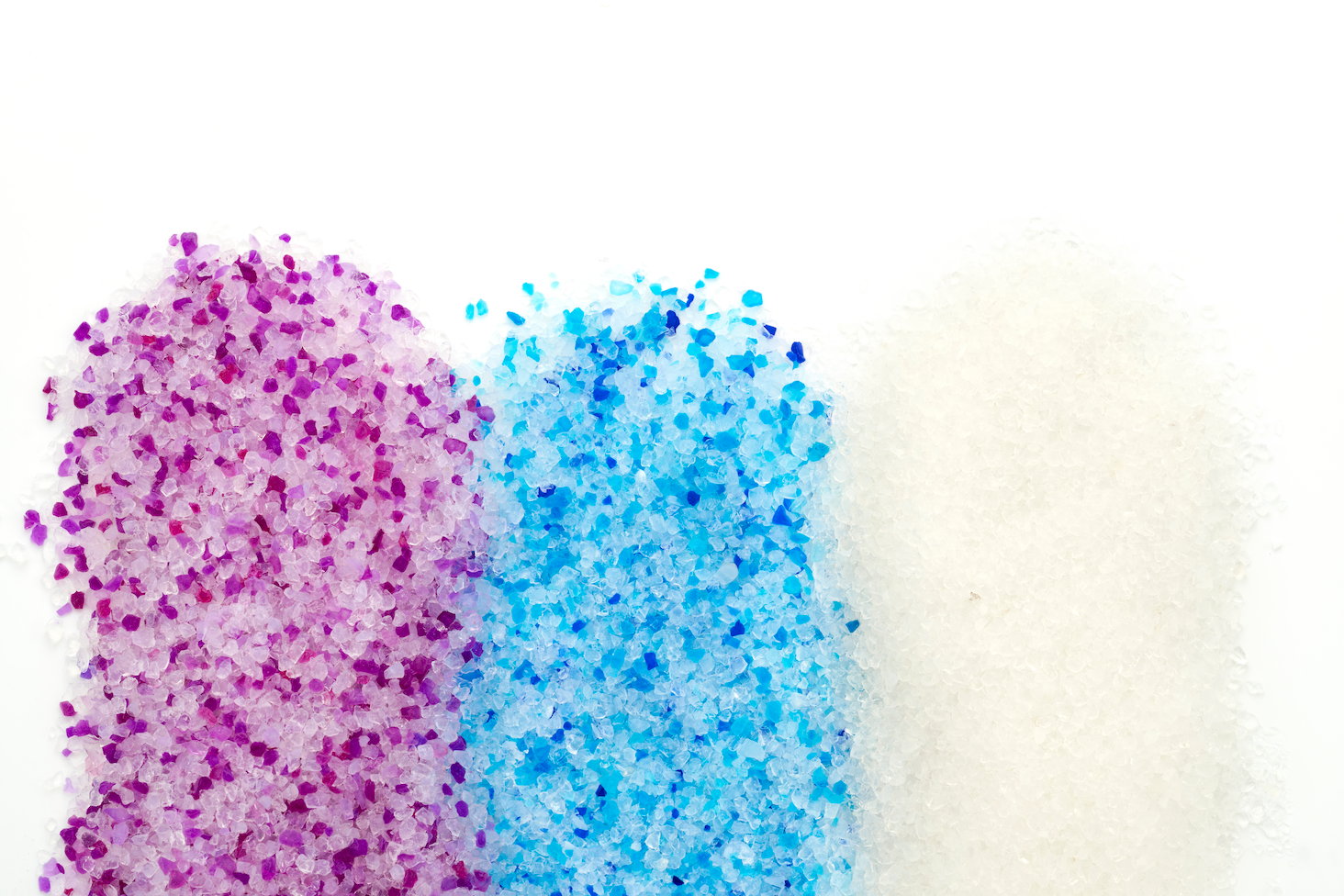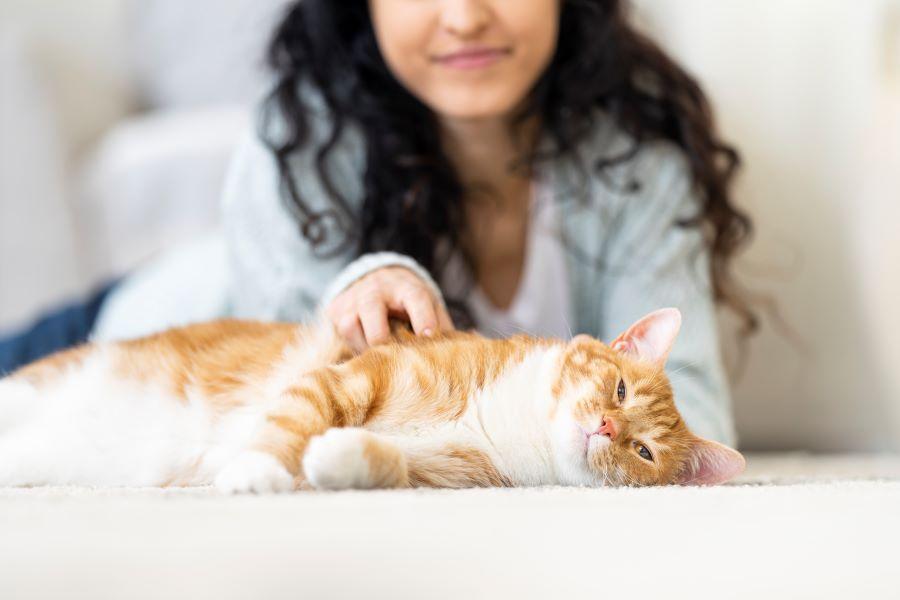
PetSafe® Expert
PetSafe® Guest
Cat Litter Types
Just as there are many different cat breeds, there are many different types of cat litter. Trying to determine which cat litter is best for you, your cat and your home can be tricky. But if you’re curious, our team of cat litter experts has the scoop on what types of cat litter are best for your situation!
8 Different types of cat litter
1. Clumping clay cat litter
Clumping clay cat litter is the original classic. It is one of the oldest and most popular cat litter types. It forms dense clumps on contact with moisture from urine and waste, which can then be scooped out of the litter box.
Pros of clumping clay litter:
- Available everywhere
- Many brands to choose from
- Often relatively cheap
Cons of clumping clay litter:
- Very heavy, especially when soiled
- Often dusty & messy
- Prone to tracking
- Waste must be scooped
2. Non-clumping clay cat litter
Non-clumping clay cat litter is just what it sounds like – a clay litter formula that absorbs moisture without forming scoopable clumps.
Pros of non-clumping clay litter:
- No sifting or scooping clumps
- Many brands to choose from
Cons of non-clumping clay litter:
- Must be changed often
- Messy & muddy when wet
- Prone to dust and tracking
3. Crystal cat litter
Crystal cat litter is one of the newer, more innovative types of cat litter on this list. It’s made of porous silica crystals that absorb an impressive amount of fluid and it controls odor very effectively.

Pros of crystal litter:
- No clumps to scoop
- Lightweight
- Highly absorbent
- Superior odor control
- Can go weeks without changing
- 99% dust-free
- Low tracking
Cons of crystal litter:
- Can be relatively expensive pound-for-pound (but can last for weeks)
4. Natural pebble cat litter
Natural pebble cat litter, also known as diatomaceous earth cat litter, is a non-clumping litter made of naturally occurring minerals derived from fossilized microscopic algae called diatoms.
Pros of natural pebble litter:
- No need to compromise between natural & effective
- Safe & non-toxic with no added chemicals
- Highly absorbent
- Controls odor for weeks
- Uses 5X less litter than clumping clay litter
Cons of natural pebble litter:
- Can be relatively expensive pound-for-pound (but can last for weeks)
5. Paper cat litter
Paper cat litter is usually in pellet form, made of compressed, processed paper or sawdust. These pellets absorb moisture and have to be changed regularly.
Pros of paper litter:
- Usually made of recycled paper
- Sometimes biodegradable (though outdoor disposal of cat waste is generally unsafe)
Cons of paper litter:
- Needs to be changed often
- Less absorbent than other litter
- Not much odor control
- Can become sticky or caked-on when wet
6. Corn Cat Litter
Corn cat litter is made from dried corn kernels or cobs.It comes in many different forms, some clumping, some non-clumping, and some even claim to be flushable.
Pros of corn litter:
- Relatively lightweight
- Plant-based & renewable
- Sometimes flushable
- Clumping and non-clumping options
Cons of corn litter:
- Can be expensive
- Often dusty & messy
- Not much odor control
- Prone to mold growth
7. Walnut cat litter
Walnut cat litter, made of ground-up walnut shells, has many features in common with corn cat litter, being made of renewable plant-based ingredients.
Pros of walnut litter:
- Relatively lightweight
- Clumping and non-clumping options
Cons of walnut litter:
- Can be expensive
- Rough texture
- Not much odor control
- Prone to mold growth
8. Pine cat litter
Pine cat litter is made from compressed pellets of sawdust, usually pine. These hard pellets are low tracking, but have a unique texture that some cats may not prefer.
Pros of pine litter:
- Infused with natural pine scent
- Plant-based
Cons of pine litter:
- Bulky texture some cats dislike
- Often forms hard, dense, sticky clumps
- Can be a hassle to clean
What is the healthiest cat litter?
What is healthiest for you and your cat may be different than what is healthy for others. But overall, when searching for a cat litter, it’s often healthiest to consider dust (the lower, the better), odor control (the more effective, the better), and additives – all natural cat litter with no added chemicals is the healthiest choice for many cat households.
How expensive are the different types of cat litter?
A package of cat litter can be rather expensive or quite affordable, depending on what you’re looking for. However, if one moderately pricy package of crystal or natural litter lasts five times as long as one cheap package of clumping clay litter,you’ll actually save money in the long run with the more expensive package. Look at more than just price when litter shopping!
Can you mix two types of cat litter?
Depending on what types of cat litter you’re using, you can mix some cat litter types together.You generally don’t want to mix clumping cat litter with non-clumping cat litter. The exception to this is when you are working on transitioning your cat from one litter type to another – here it can actually be helpful to gradually mix the old and new litters so your cat adjusts to the new texture a little at a time.
What are the best types of cat litter?

Best cat litter for multiple cats
If you have multiple cats, we recommend trying crystal cat litter or natural pebble cat litter. These lightweight option have outstanding odor control and can go for days or weeks between changing – a must when you have multiple cats doing their business every day. If you choose to use a more traditional litter, make sure you have more than one litter box (or a bigger box), if your cats like to share!)
Best cat litter for kittens
Kittens are curious and sometimes nibble on whatever they can find. No litter is meant to be eaten, and you should always observe your kitten to prevent any accidental ingestions – but that said, given their habits, corn cat litter can be a relatively safe option for kittens.
Best cat litter for senior cats
Cats sometimes get more finicky as they age. If you have an older cat, consider the texture of litter and observe to see how your cat reacts to the feeling of the litter on their paws. We recommend low-dust, non-tracking litters like corn, paper pellet, or crystal cat litter.
Best cat litter for a self-cleaning litter box
Some self-cleaning litter boxes use crystal litter trays, while others work best with any clumping litter. If you’re considering a self-cleaning litter box (which we highly recommend!) make sure you check to see what kind of litter it uses before you buy.
There are many cat litter types out there, and each has its pros and cons. At PetSafe®, we’re here to help you and your cat enjoy every day together while thinking about the litter box as little as possible. That’s why right now, if you order our crystal litter or natural litter, you can save an extra 50% when you sign up for Autoship! With Autoship, you’ll never have to worry about running low on premium odor control. We’re all about making life with a litter box easier, so life with your cat can be better than ever!
Get Email Updates
Subscribe to the latest news, promotions, & more from PetSafe® brand.
Sign up today for the latest news, promotions, and more from PetSafe® brand.






